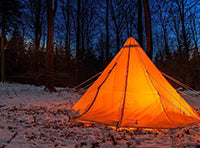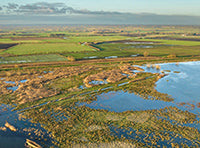In all the years that I have been wild camping I have never once been moved on. That’s not to say that it doesn’t happen, but as long as you follow all our wild camping guidance, then you’re less likely to be spotted and moved on. The basic idea is to respect the landscape and other people, being as quiet and discreet as possible.
In fact, the only time I’ve been spotted by a landowner was in the Brecon Beacons, when a farmer noticed us from down in the valley simply because he saw that his sheep were on the move up in the hills. We’d just pitched the tent when he arrived on his quad bike, with an exuberant border collie riding on the back, and asked us what we were doing. We explained we were backpackers on a long walk and thought this looked like the ideal place to pitch for the night before politely asking, obviously a little belatedly, if that would be OK. Rather than telling us to move on he was simply keen to have a chat, if slightly curious about why we wanted to camp in the middle of nowhere. However, he had absolutely no issue with us spending the night there.
One of the best ways to ensure you don’t get spotted is to pitch up at dusk and leave as dawn breaks. Obviously finding a pitch can be problematic in the dark, so the best thing to do is simply to keep an eye out for likely places to pitch towards the end of your day’s walk. If you identify a good spot, hunker down somewhere nearby out of sight, such as behind a wall, a rocky outcrop, on the edge of a wooded area or even in a dip in the ground. You might want to sort your kit out, put on a warm layer and have a snack, or even cook up some dinner. Then, just before night starts to fall, make your way back to your chosen spot and set up your tent. Very few landowners are likely to be out after nightfall, and although they are often up and out early in the morning, it’s less of an issue if you get asked to move on then, as you’d be packing up soon anyway.
But what should you do if you do get asked to move on? It’s important to stay calm, always be polite and do not argue – remember, wild camping is an offence without the landowners’ permission. And if the landowner is asking you to move on, then that’s what you must do.
Try to read the situation though – in some instances, simply feigning ignorance and apologising before explaining how far away your car is, or that you’ll have to wait until morning to get a train or bus might mean they take pity on you and let you stay. If a sob story doesn’t seem to be doing the trick, but the landowner isn’t too unfriendly, you could offer them some money, saying something like: ‘I’m sorry you’ve had to come out here. Can I give you something for your trouble?’. Slipping the landowner a fiver or a tenner will often do the trick, so it’s always worth carrying a little cash on you.
At the same time, emphasise that you are a quiet and responsible camper, not somebody who is there to get drunk, light a fire and leave empty lager cans everywhere. This often reassures the landowner that you’re a decent human being and not a lout – their concerns are usually about their livelihood. Remember that most landowners are not rich, entitled members of the landed gentry. By and large, they are normal hard-working people who lead pretty tough lives. If you can convince them that you are not a risk to their property or livestock, there’s a good chance they’ll come around.
However, if the landowner is still irate and adamant that you cannot camp on their land, then it’s time to cut your losses. Don’t be perturbed if they threaten to call the police – trespass is a civil offence, not a criminal one, so provided you haven’t caused any damage, you haven’t committed a crime. But in this situation, it pays to be an organised camper, so you can quickly break down camp and move on.
So, in summary:
- Stay calm and polite
- Be apologetic, not aggressive
- Read the situation
- Emphasise that you are a quiet and responsible camper
- Depending on the landowner’s attitude, perhaps offer them some money
- If they ask you to move on, you must do so
What you should do next is pretty dependent on the situation. It’s highly unlikely that an unfriendly landowner will tell you where the boundary of their land lies, or recommend a good spot to camp nearby, so moving your tent a few metres probably isn’t going to be an option. In this instance you might choose to pack up, walk out and head back to your car for an uncomfortable night on the back seats, or a midnight drive home. If this isn’t an option then you’ll need to find another pitch. The landowner might direct or even escort you off their land, but if you have a choice then it’s much easier to walk back over land you’ve already crossed in the day than it is to press onwards into unknown territory in the dark. While walking in, be sure to keep an eye out for all the places you could camp, noting where these are on the map, so that they feel almost familiar if you do end up pitching up in the dark.
Once you’ve walked as far as you need, or to a place you’d identified as a possible pitch, you can put the tent up again. If it’s dark by then, there’s not much chance you’ll get moved on again during the night, so you can sleep easy until the sun starts to rise. But you may want to walk out fairly early to avoid bumping into the landowner again, and head back to your car, train station or bus stop.
Though it might have resulted in an uncomfortable encounter and be an annoyance that you had to move the tent, try to think about the positives. You still got to enjoy a day’s walking and a night under the stars, so things could have been worse!
It’s also worth emphasising that getting moved on is really rare, provided you’ve picked a suitable pitch and followed our leave no trace guidance. You’re pretty unlucky if it happens to you, so try not to let it put you off wild camping altogether.














